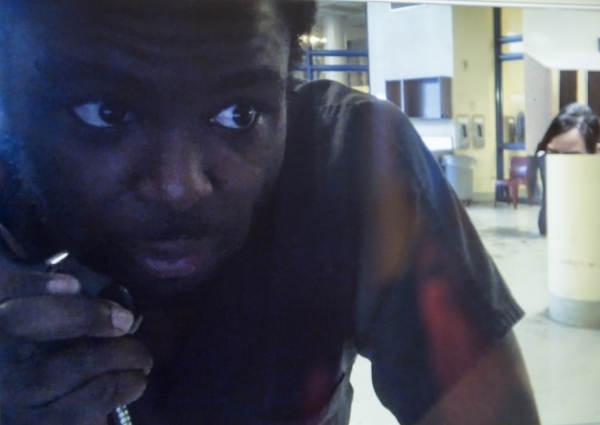Mentally ill offenders still stuck in jails
Darris Parlor claims he can sing and talk in different voices.
He tries to demonstrate via video feed from the Clark County Detention Center, where he has been sitting for at least six months.
"The man is real, the man is real," Parlor repeats at the end of his impressions.
Parlor asserts he can usually do better but struggles because of the water at the jail, which he says is harsh on his throat.
The 28-year-old is one of many mentally ill offenders who have been stuck in jails across the state, awaiting treatment to restore their competency to proceed with their criminal cases.
A federal judge recently found Nevada in violation of a lawsuit settlement requiring treatment for mentally ill offenders within seven days of being ordered by the court, which was long past due for Parlor. On June 26, doctors found him incompetent, not capable of understanding the charges against him, and unable to assist attorneys in his defense.
A court order for Parlor's competency treatment was filed July 10, but he wasn't taken to Lake's Crossing Center in Sparks for treatment until earlier this month. Lake's Crossing until recently was the state's only maximum-security psychiatric facility for evaluating and restoring offenders' competency.
But on Nov. 19, the state opened the Stein Forensic Unit in Las Vegas, which will be the equivalent to Lake's Crossing in Southern Nevada.
Parlor is back at the detention center with no end in sight.
He is scheduled to be back in court Friday, when a judge will receive a report from Lake's Crossing and will make a decision on Parlor's competency.
Parlor said during an interview that he doesn't want to be in custody anymore. Other inmates become uncomfortable when he tells himself "love and gangster stories." He also can't stand just sitting in jail.
"I want to be free," he said during the video interview Monday. "I'm being withheld over my time. I feel like I'm never getting out."
On Oct. 28, U.S. District Judge Miranda Du found Nevada to be in violation of a 2014 federal lawsuit settlement to provide prompt treatment to court-ordered offenders.
As of Sept. 1, the state was required to provide treatment to offenders within seven days.
During last month's hearing, Du directed state officials to work with the Clark County public defender's office, which filed the lawsuit, to come up with a remedy for the state to come into compliance. That proposal is due Monday.
Offenders, such as Parlor, end up spending much more time behind bars compared with non-mentally ill offenders, said Christy Craig, a deputy public defender.
Mentally ill offenders typically wait about 75 days to get treatment. Once they are admitted, the average length of time for treatment is about 90 days, Craig said.
"Overall, the person who is mentally ill spends 90 to 165 days more (in custody) than a non-mentally ill person with the same or similar crime," she said Tuesday.
If offenders end up going to prison, the time gets credited. But offenders who go to trial have to wait up to 165 days before they can start participating in their defense.
"You lose the ability to promptly prepare a defense, find witnesses and evidence," Craig said.
Parlor is facing charges for home invasion, domestic battery by strangulation and burglary. They are all felony charges, according to a criminal complaint filed May 7.
"I feel like they are just juggling me around," he said.
As of Nov. 20, there were 29 offenders at the Clark County Detention Center alone, waiting to be transferred for treatment, Craig said. But that was after the state opened Stein at the Rawson-Neal Psychiatric Hospital, which will eventually bring the state's total forensic beds to 153 — 86 in Northern Nevada and 67 in Southern Nevada.
Stein took in six offenders when it opened, and it will phase in several court-ordered patients.
Inmates who are slated to be transferred for treatment in January will have waited about 69 days, Craig said.
Based on an evaluation of the state's forensic capacity to treat this population, the state could clear the wait list in Clark County by February. The timeline is based on the assumption that the state would continue to get an average of 28 commitments per month, and the average length of stay at a forensic facility would be 90 days. The purpose of the evaluation conducted by state officials this month is to assess the current and future demand for forensic mental health services in the state.
The report also outlines a plan for the state to address the current wait list, as well as planning for the state to be able to admit patients within the required seven days in the future.
Several weeks ago, 86 offenders statewide were waiting for transfer, said Chrystal Main, spokeswoman for the state's Health and Human Services Department.
"It's been fairly volatile and it's been volatile on a daily basis as well as on a yearly basis," Cody Phinney, administrator for the Nevada Public and Behavioral Health Division, said of the need for such services.
Sometimes there are a lot more court commitments than discharges, Phinney said. It's a complex issue for many reasons and will take time to resolve, but the opening of Stein was crucial, she added.
As part of the evaluation, the state developed three scenarios based on the growth in commitments that the system has experienced in the past two years, according to evaluation documents.
Based on a 1 percent low-growth scenario, the state would have adequate capacity for these kind of beds until 2018. Based on a 20 percent medium-growth scenario, the state's capacity would become insufficient again by 2018. Based on a 34 percent high growth-scenario, the state would need more beds to treat this population before 2018, according to its analysis.
"This has been growing nationwide," Phinney said of the need.
Part of the analysis will be included in the state's proposal, which is due Monday.
Craig said it would have been nice to have those statistics in 2014, but she's happy that state officials now have those numbers in hand.
"We are working on a resolution that incorporates the numbers they gave us," she said. "We are all working toward the same goal."
Contact Yesenia Amaro at yamaro@reviewjournal.com or 702-477-3843. Find her on Twitter: @YeseniaAmaro































